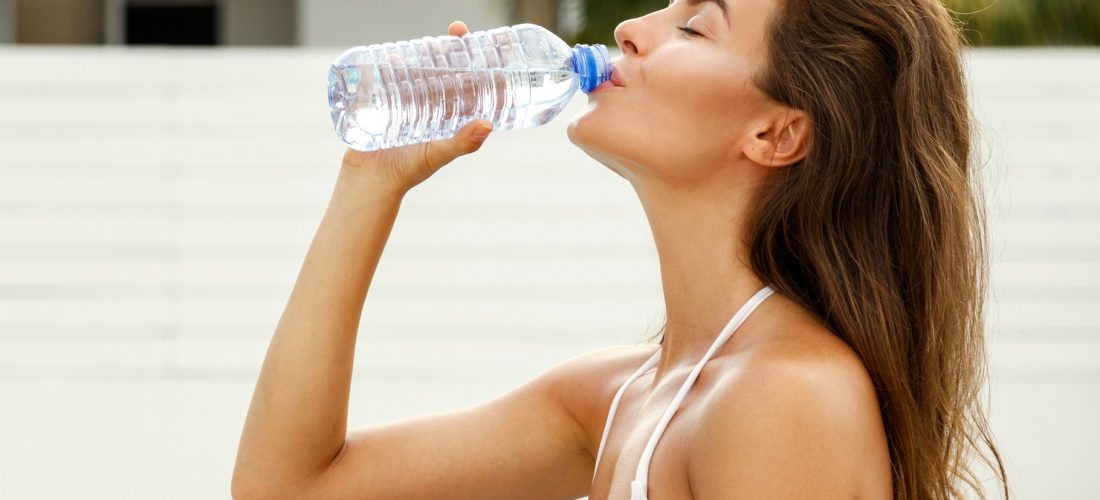
Hydration during exercise
Hydration during exercise
What happens when sweating?
Physical effort is an integral part of doing sports. During the work of muscles, the burning of energy components occurs and significant amounts of heat are created, which must be removed to prevent overheating of the body. This is related to the loss of body water, because the surplus of heat is given away through dilated blood vessels and evaporation through the skin surface and through sweating.
Water is also lost through the respiratory tract, whose activity accelerates during exercise and with increasing temperature. The pace of dehydration during and after exercise is very individual and depends, among others, on the state of health, age, intensity and duration of the effort as well as on the temperature and humidity of the environment.
The largest amount of water is lost with sweat. Its primary task is to cool the body. Therefore, man sweats with a fever, when the ambient temperature is high, and in situations of accelerated metabolism and excessive heat production. Increased sweat production occurs not only at the time of exercise, but also some time after its completion, while the high outside temperature and high humidity cause that we sweat even more.
Sweat consists primarily of water (approx. 98%), but also contains substances such as sodium, chlorine, uric acid, urea, amino acids and glucose. The composition of sweat varies depending on age, health and diet.
How much fluid do we lose during training?
As a result of intensive sweating and water loss, fluid shifts can occur in the area of outside and intracellular space. Characteristic symptoms of dehydration appear, such as thirst, dry mouth, impaired salivation, redness of the skin, irritability, impaired coordination and general weakness. In the body, the volume of circulating blood decreases and its viscosity increases, which further burden the circulatory system.
In response to the changes, the body tends to retain the necessary quantity of water by reducing the volume of urine output. As a result, the kidneys produce small amounts of concentrated urine, which may promote the development of kidney stones. In addition, insufficient urine production is the cause of retention of toxic substances in the body.
During an hour of physical effort, an adult loses on average about 1-1.5 liters of sweat. Intense physical effort, e.g. a soccer match or marathon run, may result in even greater fluid loss (up to 3-4 liters). Each liter of excreted sweat contains 2.3-3.4 g NaCl.
After the effort is completed, you should aim not only to replenish the water deficit, but also the missing electrolytes. The amount of sweat lost, i.e. The sweating rate can be estimated from the following formula:
Amount of sweat lost per hour = (body weight before exercise – body weight after exercise + number of drinks consumed – amount of urine excreted): for the duration of the effort in hours.
How to protect yourself against dehydration while playing sports?
The consequences of intense physical exercise should be remembered by everyone, including those who take physical activity for leisure or relaxation. It is worth considering how you can safely and effectively restore proper hydration.
In the human body, and more precisely in the digestive tract, several mechanisms are responsible for the absorption of water. However, not all liquid substances administered to the gastrointestinal tract are absorbed equally by the body.
Liquids with increased osmolarity, such as juices or some colored carbonated drinks, are much less absorbed than isotonic or reduced osmolarity fluids. Also, giving only water or mineral water is not a good option. Drinking pure water does not provide the body with the necessary minerals and energy.
However, when it comes to mineral waters, most of them contain various electrolytes, but their concentration and proportions rarely allow to compensate for the losses associated with effort. Consumption of carbonated water should also be avoided, because the carbon dioxide contained in it gives a feeling of fullness and may cause less fluid intake. When it comes to beverages containing caffeine, they have a stimulating effect on the body and reduce fatigue, but also cause increased urine output, i.e. they can lead to further loss of fluid or impaired hydration.
Available for sale Oral Rehydration Solutions (ORS) appear to be recommended in situations involving excessive water loss during exercise. First of all, the properly composed ORS composition guarantees their rapid absorption from the gastrointestinal tract, and thus the rapid restoration of water and electrolyte balance. Oral rehydration fluids contain water, glucose, sodium, chlorine and potassium, which are the ingredients that are lost in the greatest amount during exercise.
The addition of glucose ensures efficient assimilation of the given water, because in the intestine its transport is carried out in conjunction with glucose, and this process is driven by the so-called ATP-sodium potassium sodium pump. The osmolarity of irrigation fluids is also important. ORS have osmolarity between 225 and 260 mOsm / l.
Too high osmolarity may impair normal rehydration. Not without significance is the fact that the effectiveness and safety of ORS has been confirmed in numerous studies, conducted primarily in people dehydrated in the course of diarrhea (i.e. they worked in situations where water absorption is significantly impaired).
The studies concerned both adults and children. ORS are better tolerated if given in chilled form. This not only accelerates the absorption of fluid from the digestive tract, but also lowers body temperature. The most optimal temperature of consumed liquids should be around 4-10 ° C.
Hydration of athletes
According to the recommendations of the National Athletic Trainers Assocciation report of 2000, regarding the supplementation of body fluids in athletes, physical exercise should be preceded by the creation of the so-called water reserve, i.e. the consumption of about 500 ml of water (one to 30 minutes before training).
Remember to replenish fluids during and after exercise. Athletes are recommended to consume isotonic beverages characterized by the most optimal concentration of electrolytes and carbohydrates.
The carbohydrate content should not be higher than 6-8g / 100ml, and the sodium concentration should not exceed 40-110 mg / 100ml. These requirements are met by ORS. Within 2 hours of ending exercise, it is recommended to consume approximately 1,300 to 1,500 ml of fluid per kg of weight lost afterwards.
Sport is health, but when practicing it, you need to be aware that physical effort is not only burning unnecessary calories or raising fitness, but also changes in the body, which, when not aligned in time, can cause serious damage.
Dr. Kinga Kowalska – Duplaga



